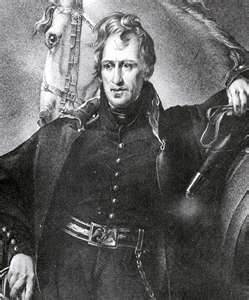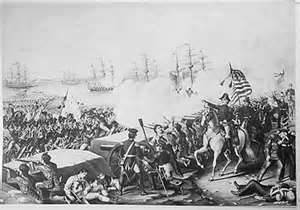Andrew Jackson: President of the People
Part 1: Rise to Fame Andrew Jackson, a hard-living lawyer, soldier, and politician with a fiery temper and a desperate need to prove himself, worked his way up from modest beginnings and an orphan youth to be the seventh President of the United States. Historians differ on where Jackson was born, although most agree that his parents, Scots-Irish Presbyterians, were living in South Carolina at the time. They left Ireland in 1765, and young Andrew was born on March 15, 1767, three weeks after his father, 29, was killed in an accident. His parents had had two children, Hugh and Robert, before he was born.
Andrew and Robert got smallpox while they were in captivity. Their mother, Elizabeth, paid for their release, but Robert died before he could be freed. Elizabeth then helped nurse prisoners of war who had contracted cholera. She got the disease herself and died in 1781. Thus, at age 14, Andrew was an orphan. His family didn't have much money, so he had to rely on his own talents and resources. He studied the law and proved adept as a businessman, owning a plantation and a general store in what is now Tennessee. In 1804, he bought the Hermitage, a plantation near present-day Nashville that he would own for the rest of his life. To support the plantation, Jackson owned slaves, more than 100 in all. By this time, Jackson was gaining political experience as well. He was elected a delegate to the Tennessee constitutional convention and was that new state's first Representative. He also served in the Senate before returning home to be a judge on the Tennessee Supreme Court. Jackson gained command of the Tennessee militia in 1801, and this experience led to his being granted a leading role in the struggle against Native American tribes during the War of 1812. Davy Crockett and Sam Houston fought with Jackson during this time. Jackson's major victory during this struggle was the Battle of Horseshoe Bend, in 1814. For his success, Jackson was made a Major General. In a sign of things to come, Jackson forced the defeated Creek tribes to give lots of land, 20 million acres, in what is now Alabama and Georgia.
Jackson continued in the military vein in the next few years, leading campaigns against the Seminole and Creek tribes in Georgia. He was military governor of the Florida territory for awhile as well. By the time of the 1824 election, Jackson was well-known and popular throughout the country. By this time, the Federalist Party had declined beyond recognition and the Democratic-Republican Party was effectively the only political party recognized by most Americans. Jackson was a member of this party and secured a presidential nomination, along with then-Treasury Secretary William Crawford, then-Speaker of the House Henry Clay, and then-Secretary of State John Quincy Adams. The four-way split resulted in no one candidate with a clear majority. The resulting selection process in the House made Adams the President. Jackson, also elected to his old Senate seat, served in that capacity for several months but then resigned. Next page > Fame and Spoils > Page 1, 2 |
|
Social Studies for Kids
copyright 2002–2025
David White



 Andrew joined the local militia when he was 13, during the
Andrew joined the local militia when he was 13, during the  Jackson gained everlasting fame as the commander of American forces during the Battle of New Orleans, the battle that was fought after peace had been declared for the War of 1812. The Americans were outnumbered 3-to-2 but won a decisive victory anyway. It was during this battle that Jackson earned his nickname. His troops said he was "tough as old hickory wood on the battlefield. After that, he was known as "Old Hickory."
Jackson gained everlasting fame as the commander of American forces during the Battle of New Orleans, the battle that was fought after peace had been declared for the War of 1812. The Americans were outnumbered 3-to-2 but won a decisive victory anyway. It was during this battle that Jackson earned his nickname. His troops said he was "tough as old hickory wood on the battlefield. After that, he was known as "Old Hickory."
